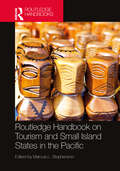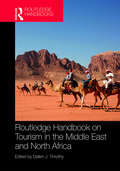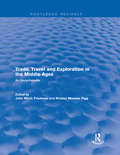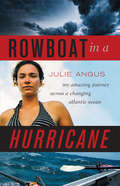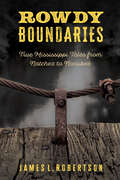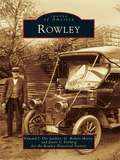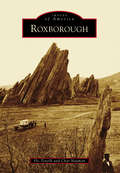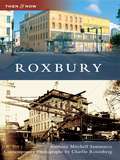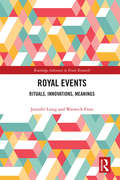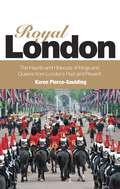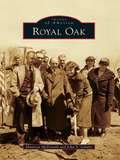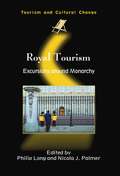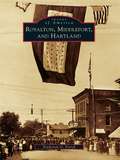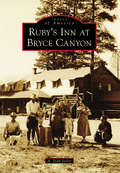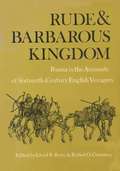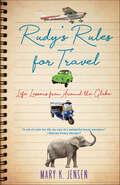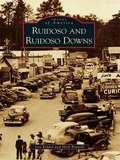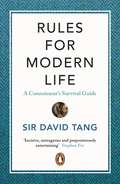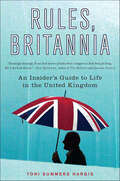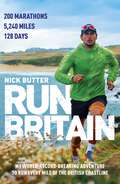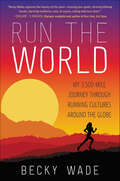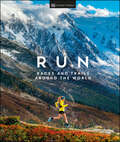- Table View
- List View
Routledge Handbook on Tourism and Small Island States in the Pacific
by Marcus L. StephensonThis timely handbook critically examines the development and role of tourism in small Pacific Island states located across Melanesia, Micronesia and Polynesia. The volume presents an expansive evaluation of current issues, challenges and potentialities for the 13 self-governing states. Interdisciplinary in coverage and borne of a varied and international authorship, this handbook incorporates 27 specifically commissioned and original contributions. Structured into four thematic sections and embellished with insightful tables and illustrations throughout, the overarching ethos of this volume is to contribute to framing the role of tourism, tourism development and the tourism industry within the context of self-governing Pacific Island states faced with the challenge of pursuing an independent path of development. In doing so, the work highlights and deciphers various tourism development perplexities in the Pacific, examining closely the intersecting sociocultural, geopolitical, environmental, organizational, operational and strategic challenges. This volume, thus, discusses a range of issues: facilitators and inhibitors of tourism growth and development; climate change, ecological concerns, and eco-tourism; non-tourism and undertourism; crisis management and the COVID-19 virus; transportation and tourism infrastructural concerns; tourism policy and planning (including tourism governance); sectoral links between tourism; food and agriculture; gender and micro-entrepreneurship; community management and participation; cultural and natural heritage sites; and the handicraft industry. The work pays critical attention to the various trajectories of sustainable tourism and the United Nations Sustainable Development Goals. Despite the many challenges and concerns raised, the book implicates the importance of good governance, progressive post-COVID-19 recovery strategies and directives, and creative and imaginative options in the successful development, re-development and advancement of tourism. As a definitive reference resource for this subject area, this handbook will be of great interest to students, researchers and academics within tourism, development studies, geography, Pacific studies, sustainability and environmental studies.
Routledge Handbook on Tourism in the Middle East and North Africa
by Dallen J. TimothyThe Routledge Handbook on Tourism in the Middle East and North Africa examines the importance of tourism as a historical, economic, social, environmental, religious and political force in the Middle East and North Africa (MENA). It highlights the ecological and resource challenges related to water, desert environments, climate change and oil. It provides an in-depth analysis of the geopolitical conditions that have long determined the patterns of tourism demand and supply throughout the region and how these play out in the everyday lives of residents and destinations as they attempt to grow tourism or ignore it entirely. While cultural heritage remains the primary tourism asset for the region as a whole, many new types of tourisms are emerging, especially in the Arabian Gulf region, where hyper-development is closely associated with the increasingly prominent role of luxury real estate and shopping, retail, medical tourism, cruises and transit tourism. The growing phenomenon of an expatriate workforce, and how its segregation from the citizenry creates a dual socio-economic system in several countries, is unmatched by other regions of the world. Many indigenous people of MENA keep themselves apart from other dominant groups in the region, although these social boundaries are becoming increasingly blurred as tourism, being one socio-economic force for change, has inspired many nomadic peoples to settle into towns and villages and rely more on tourists for their livelihoods. All of these issues and more shape the foundations of this book. This Handbook is the first of its kind to examine tourism from a broad regional and inclusive perspective, surveying a broad range of social, cultural, heritage, ecological and political matters in a single volume. With a wide range of contributors, many of whom are natives of the Middle East and North Africa, this Handbook is a vital resource for students and scholars interested in Tourism, Middle East Studies and Geography.
Routledge Revivals: An Encyclopedia (Routledge Revivals: Routledge Encyclopedias of the Middle Ages #4)
by John Block Friedman Kristen Mossler FiggFirst published in 2000, Trade, Travel, and Exploration: An Encyclopedia covers the people, places, technologies, and intellectual concepts that contributed to trade, travel and exploration during the Middle Ages, from the years C.E. 525 to 1492.This comprehensive reference work contains entries on a large number of subjects, including familiar topics such as the voyages of Columbus and Marco Polo, and also information that is more difficult to find, for example, the traditions of travel among Muslim women and the influence of Viking travel on navigation and geographical knowledge. Bringing together more than 175 scholars from a variety of disciplines, it minimizes Eurocentric bias and offers extensive coverage of such topics as travel within Inner Asia, Mongol society, and the spread of Buddhism. Including an extensive map program and more than 125 illustrations, as well as bibliographies, a comprehensive index and "see also" references, Medieval Trade, Travel, and Exploration is a valuable reference guide for undergraduate and graduate students, scholars and also the general reader.
Rowboat in a Hurricane: My Amazing Journey Across a Changing Atlantic Ocean
by Julie AngusAn intrepid scientist and her fiancé—National Geographic's 2007 Adventurers of the Year—observe the changing ocean while rowing across the Atlantic. In 2005-06, Julie Angus and her fiancé Colin rowed 10,000 kilometers across the Atlantic Ocean—from Lisbon to Costa Rica—making Angus the first woman in the world to travel from mainland to mainland in a rowboat. The 145-day journey gave Angus, a trained biologist, a unique perspective on the ocean. The slow-moving boat became an ecosystem unto itself, attracting barnacles, dorado fish, trigger fish, turtles, sharks, whales, birds, and more, which she was able to observe and document. Angus also saw unmistakable signs of the ocean&’s devastation, with far more plastic bottles, wrappers, toys, and bags than sharks or other once-common sea life. Four cyclones, including two hurricanes, hammered the small boat so intensely that Angus and her companion weren't sure they would survive. Rowboat in a Hurricane records this amazing journey in meticulous, dramatic detail, in the process offering a personal record of an awe-inspiring ecosystem, its fascinating denizens, and the mounting threats to its existence.
Rowdy Boundaries: True Mississippi Tales from Natchez to Noxubee
by James L. RobertsonDwelling along the Mississippi River, the Tennessee state line, the Tenn-Tom Waterway, and the Gulf of Mexico are a trove of characters with fascinating lives and histories. In Rowdy Boundaries: True Mississippi Tales from Natchez to Noxubee, author James L. Robertson weaves these stories to reveal a tapestry of Mississippi’s border counties and the towns and people that occupy them. From his unique vantage as a former Mississippi Supreme Court justice and seasoned lawyer, he documents the legal, geographical, and biographical tales revealed during his journeys along and within the state lines.The volume features the true stories of musicians, authors, portrait painters, and football players, as well as political activists, educators, politicians, and judges. Also featured are tributes to noteworthy newspaper editors and columnists for their many contributions over the years. Robertson covers pivotal moments in Mississippi history, including the Mississippi Married Women’s Property Act of 1839, the development of Chinese culture in the Mississippi Delta, and 1964 Freedom Summer. He does not shy away from the tragedies of the past, discussing lynchings and murders that still haunt the state today. From ghost towns in Jefferson County to the Slugburger Festival in Corinth, stopping en route for a mint julep in Columbus, Robertson puts a human face on Mississippi history and tells a good yarn along the way.
Rowley
by Doris V. Fyrberg Edward J. Des Jardins G. Robert MerryAs one of the earliest settlements in America, Rowley was founded by Rev. Ezekiel Rogers in 1639. Few towns as small in population have given more to the nation than Rowley, with so many firsts making up its history-from the great Puritan migration voyage across the sea that Rogers shared with the nation's first printing press to Lorenzo Bradstreet's invention of the Bradstreet Sleeper, which later evolved into the Pullman sleeping car.Rowley has much to offer: scenes of the village, and the historic town common, or the "Training Place," where Benedict Arnold's expedition to Quebec encamped in 1775, the picturesque Glen Mills area with its 1642 stone arch bridge, and the site of the first fulling mill in the colonies (1642-1643), which manufactured the first cloth made in the Western world. The book displays images of country stores, wagon peddlers, and early gristmills and sawmills. It also shows shoe manufacturing, boatbuilding (at its peak in 1900), farming, and salt marsh haying. It truly brings to life another era in American history.
Roxborough (Images of America)
by Char Nauman Flo TonelliPaleo-Indians hunted Ice Age mammoths and ancestral bison in what is now Roxborough, Colorado. In 1820, Stephen A. Long's expedition traveled west across the plains into America's western frontier and camped along the South Platte River where water rushed into the Platte Valley from Rocky Mountain peaks. They discovered an area described by their geologist as "a range of naked and almost perpendicular rocks . . . resembling a vast wall, parallel to the base of the mountain . . . the whole scenery truly picturesque and romantic." During the next 200 years, Roxborough has been home to Native Americans, mountain men, homesteaders, farmers, miners, dam builders, ranchers, railroad men, cowboys, and rocket scientists. Families live in sight of hogback formations, soaring red rocks, foothills, and mountains. Thousands arrive each year to hike trails in Roxborough State Park, Waterton Canyon, Colorado Trail, and Highline Canal. Roxborough's history, geologic wonders, and wilderness is a story of those whose eyes reached toward the stars.
Roxbury
by Anthony Mitchell Sammarco Charlie RosenbergRoxbury, annexed to Boston in 1867, has seen tremendous change as a result of land development and a shifting population. Today Roxbury is a "streetcar suburb" of the city and a thriving nexus of cultures, religions, and races.
Royal Events: Rituals, Innovations, Meanings (Routledge Advances in Event Research Series)
by Warwick Frost Jennifer LaingRoyal events such as coronations and jubilees encompass a wide spectrum of planned events involving monarchs and their families that are strategically designed to reinforce the role of royalty within social and political structures. Royal events may have a long heritage, but often involve traditions that are invented, revived or undergoing major innovations in response to changing times or to meet different purposes. The change from absolutism towards constitutional monarchies has seen a shift towards using royal events to promote national identity, community and inclusiveness. While the function and meaning of royal ritual and ceremony is a product of its particular political, economic and cultural context, conversely, royal events are often an influence on the broader milieu. This book is the first to explore royal events within the context of Events Studies, and takes an historical approach, examining the development of royal events through different periods. It starts with four broad pre-modern eras, namely Classical, Byzantine, the Dark Ages and the Medieval Period, then moves through to the early modern dynasties such as the Tudors, Stuarts, Georgians and Bourbons and on to contemporary times, incorporating the Victorian and Edwardian eras and the current reign of Elizabeth II, including the legacy of Diana and an analysis of current issues affecting royal events. Themes emphasised throughout include the institutional dynamism of royalty, the invention of tradition, the ritual structure of events, the impact of the media and the influence of individual tastemakers. This multidisciplinary work will appeal to postgraduate students and academics from a wide variety of disciplines, including cultural studies, history, tourism, events and sociology.
Royal London: Colouful Tales of Pomp and Pageantry From London's Past and Present
by Karen Pierce GouldingWhere is the only tube station where a crown prince has died? Where is the oak tree where Good Queen Bess took her rest? Which Queen befriended the Elephant Man - and played a part in the development of the modern Olympic Games? Where are the favourite shopping haunts of today's young royals? From Westminster to Greenwich, Kensington to the Tower of London, no other city in the world is steeped in quite as much royal history as London. Overflowing with royal boroughs, royal palaces, royal parks and gardens, London has played host to key historical events for over a thousand years. Royal London brings together the best of the drama and intrigue of royal history, and guides readers to the very spot where the events happened. Topics covered also include: Royals round the monopoly board Royals sporting London Royal stops on the underground Royal food and drink Areas named after royals Royal monuments/statues/plaques Royals and the military Royal plots and conspiracies A unique and indispensable guide for Londoners and visitors alike with an interest in all things royal.
Royal London: Colouful Tales of Pomp and Pageantry From London's Past and Present
by Karen Pierce GouldingWhere is the only tube station where a crown prince has died?Where is the oak tree where Good Queen Bess took her rest?Which Queen befriended the Elephant Man - and played a part in the development of the modern Olympic Games?Where are the favourite shopping haunts of today's young royals?From Westminster to Greenwich, Kensington to the Tower of London, no other city in the world is steeped in quite as much royal history as London. Overflowing with royal boroughs, royal palaces, royal parks and gardens, London has played host to key historical events for over a thousand years. Royal London brings together the best of the drama and intrigue of royal history, and guides readers to the very spot where the events happened. Topics covered also include: Royals round the monopoly board Royals sporting London Royal stops on the underground Royal food and drink Areas named after royals Royal monuments/statues/plaques Royals and the military Royal plots and conspiraciesA unique and indispensable guide for Londoners and visitors alike with an interest in all things royal.
Royal Oak
by John S. Schultz Maureen McdonaldStories describe Michigan's first governor, Lewis Cass, signing a treaty with the Chippewa in 1819 and resting nearby with companions under a swamp oak a few miles north of Detroit. Cass told the story of Prince Charles II, who took refuge in 1651 under a mighty oak tree after the Battle of Worcester and lived to be crowned king. Cass later designated the locality, including the southernmost townships in Oakland County, as Royal Oak. This sector became a village in 1891 and a city in 1921. Strong roots have helped the "City of Trees" maintain its viability through the years. Home to William Beaumont Hospital, assorted high-tech graphic and sound studios, and a world-class zoo, today Royal Oak draws people into its pedestrian-friendly downtown for an eclectic mix of bars, sidewalk cafés, boutiques, theaters, and upscale lofts.
Royal Tourism
by Nicola J. Palmer Philip LongThere are multiple and complex relationships between royalty and tourism which have received little attention in the academic literature. This book draws on historical, sociological and cultural perspectives in its collection of chapters that examine the royal tourism phenomenon in several international and theoretical contexts. Authors in this volume examine for example: the history, development and trajectories of 'royal tourism'; 'royal tourism' and national identities; the interpretation of royalty to tourists; the image(s) and representations of 'royal tourism'; tourist perceptions of royalty and royal properties and sites; royalty, tourism and national image, identity and citizenship.
Royalton, Middleport, and Hartland: Through Time (Images of America)
by Mayor Julia Maedl Frederick G. FierchNestled in the eastern end of Niagara County are the townships of Royalton and Hartland. The village of Middleport lies mostly within the town of Royalton, with a small part in the town of Hartland. When the Erie Canal was built through Royalton and opened in 1824, it connected the interior of the United States with the Atlantic Ocean, and the entire area was forever changed by the canal. The area earned a reputation as an excellent fruit-farming region and orchards appeared, along with the chemical-spraying industry. Royalton, Hartland, and especially Middleport became extraordinarily important in these two industries, and the canal was the focal point. The Erie Canal continued to be a major shipping factor for the region until the barges discontinued use in the 1950s.
Ruby's Inn at Bryce Canyon
by A. Jean SeilerIn the spring of 1916, Ruby and Minnie Syrett packed up their children and belongings and traveled to their new homestead at the gateway of what would one day become Bryce Canyon National Park. In the early 20th century, Southern Utah was still pioneer country. Hardy descendants of Mormon converts worked to tame the land and create productive farms. Little time was left to marvel at the scenery that surrounded their small communities. By 1919, the Syretts found themselves providing food and lodging for visitors who had learned of the canyon's scenic wonder. A tourist lodge was constructed and opened in the spring of 1920. By 1923, Bryce's Canyon was well known throughout the country and was proclaimed a national monument. From the beginning, Ruby and Minnie were committed to providing the very best in heartfelt Western hospitality. This small community continues to provide the facilities and amenities required to take care of the 1.5 million annual visitors from around the world who come to enjoy Bryce Canyon National Park.
Rude & Barbarous Kingdom
by Lloyd E. Berry Robert O. CrummeyLloyd E. Berry and Robert O. Crummey offer edited accounts of six English voyagers and their experiences in Muscovy Russia between 1553 and 1600. With modernized spelling and presentation, these accounts are accompanied by a glossary of Russian terms, introductions of their authors, and annotations that help put the travelers’ narratives into perspective.
Rudy's Rules for Travel: Life Lessons from Around the Globe
by Mary K. JensenMost honeymoons, Mary knows, do not start this way. Lying outside on the sloping attic roof in Edinburgh, listening to the soft snores of her groom, she realizes that Rudy’s number one rule, “adapt," once again reigns. Rudy’s Rules for Travel takes you across the twentieth-century globe with intrepid, frugal Rudy and his spouse Mary, a catastrophic thinker seeking comfort. Whether stalled in a Spanish car tunnel, stranded atop a runaway elephant, or held at rifle-point at a Soviet border, Rudy has a rule for every occasion—for example, “Relax, some kind stranger will appear.” Mary, meanwhile, has her deep breathing and her own commandment: “Expect the worst.” The two are a picture of contrast. As Mary was being born, Rudy was a new American citizen flying US Air Force missions over his homeland, Germany. His father was a seaman, hers an accountant. And when this marriage of opposites goes traveling, their stories combine laugh-out-loud humor with poignant lessons from the odyssey of a World War II veteran. So start packing—you’ll want to join these two.
Rugrats Blast Off
by Stephanie St. PierreThe Rugrats decide to go on a mission to outer space--in their car.
Ruidoso and Ruidoso Downs
by Lyn Kidder Herb BrunellThe Sacramento Mountains are an oasis of cool pine forests, alpine meadows, and fast-flowing streams. For more than a century, the area has been a summer haven for people living in the surrounding desert. The town of Ruidoso-a Spanish word meaning "noisy"-is named for the sound of water rushing over rocks as the Rio Ruidoso runs (and occasionally rampages) through the town. The town's first resident, Civil War veteran Paul Dowlin, built an adobe mill that harnessed the river's power. Word of the area's beauty soon spread. Traveling over primitive roads, first by horse and wagon and later by automobile, visitors escaped the summer heat in what became known as "The Playground of the Southwest." Some came for horse racing or the gambling and night life offered by the town's many bars; others came to hike, fish, and later ski on the slopes of Sierra Blanca, the mountain whose 12,000-foot peak provides a stunning backdrop for the town.
Rules for Modern Life: A Connoisseur's Survival Guide
by Sir David TangDo gentlemen wear shorts? What are the rules regarding interior decor in a high-security prison? Is it ever acceptable to send Valentine's cards to one's pets?The twenty-first century is an age of innumerable social conundrums. Around every corner lies a potential faux pas waiting to happen. But if you've ever struggled for the right response to an unwelcome gift or floundered for conversation at the dinner party from hell, fear not: help is at hand.In Rules for Modern Life, Sir David Tang, resident agony uncle at the Financial Times, delivers a satirical masterclass in navigating the social niceties of modern life. Whether you're unsure of the etiquette of doggy bags or wondering whether a massage room in your second home would be de trop, Sir David has the answer to all your social anxieties - and much more besides.
Rules, Britannia: An Insider's Guide to Life in the United Kingdom
by Toni Summers HargisHow do you respond to a dinner invitation that says "Eight for eight thirty"? What might induce you to get off a London train at a place called Mud Chute? When is it okay to drive over a sleeping policeman? And why do teh Brits keep saying "Who's she, the cat's mother"?Rules, Britannia is an invaluable resource for Americans who want to make a smooth transition when visiting or relocating to the UK. This entertaining and practical insider's guide contains scores of established do's and dont's that only a Brit would know.Most of us know that an elevator is called a "lifet," a toilet is a "loo," and the trunk of your car is the "boot," but who would have a clue about a "sprog" or a "gobsmacked berk"? These phrases are part of daily conservation in the UK, and leave many visiting Americans as baffled as if they listening to a foreign language.Covering such essential topics as vocabulary, house- or "flat"-hunting, business culture, child rearing, and even relationship etiqutte, Rules, Britannia will ease the anxiety that comes with a transatlantic move or extended visit, and is sure to make any old Yank feel like a regular Joe Bloggs.
Rum Punch and Revolution: Taverngoing and Public Life in Eighteenth-century Philadelphia
by Peter Thompson'Twas Honest old Noah first planted the Vine, And mended his morals by drinking its Wine. --from a drinking song by Benjamin Franklin. There were, Peter Thompson notes, some one hundred and fifty synonyms for inebriation in common use in colonial Philadelphia and, on the eve of the Revolution, just as many licensed drinking establishments. Clearly, eighteenth-century Philadelphians were drawn to the tavern. In addition to the obvious lure of the liquor, taverns offered overnight accommodations, meals, and stabling for visitors. They also served as places to gossip, gamble, find work, make trades, and gather news. In Rum Punch and Revolution, Thompson shows how the public houses provided a setting in which Philadelphians from all walks of life revealed their characters and ideas as nowhere else. He takes the reader into the cramped confines of the colonial bar room, describing the friendships, misunderstandings and conflicts which were generated among the city's drinkers and investigates the profitability of running a tavern in a city which, until independence, set maximum prices on the cost of drinks and services in its public houses. Taverngoing, Thompson writes, fostered a sense of citizenship that influenced political debate in colonial Philadelphia and became an issue in the city's revolution. Opinionated and profoundly undeferential, taverngoers did more than drink; they forced their political leaders to consider whether and how public opinion could be represented in the counsels of a newly independent nation.
Run Britain: My World Record-Breaking Adventure to Run Every Mile of the British Coastline
by Nick ButterIn the spring of 2021, as the UK's latest pandemic lockdowns were lifted, Nick Butter set out from the Eden Project to become the fastest person to cover every mile of Britain's mainland coastline on foot.Battling the most extreme winds Britain had seen in 100 years, days of torrential rain and the unrelenting hills of Western Scotland and Cornwall, Nick suffered two broken bones and countless injuries, whilst taking on two marathons a day, every day, for 100 days.Covering an extraordinary 5,250 miles, running for over 12 hours a day, struggling to take in the 8,000 daily calories required to fuel his body, Nick battled sleep deprivation and extreme weight loss as he pushed his body and mind to their limit.Supported by close friends and family (including his ever-dependable right-hand man, Andy Swain, whose diary extracts feature in this book), Nick experienced spiralling lows and euphoric highs. As he traversed footpaths, country lanes and busy A roads, he passed through over two thousand coastal communities, buoyed along by supporters cheering from windows, balconies, passing cars and pavements, by school children and fellow runners, and by the stunning sights and sounds of the British coast.Run Britain is Nick's account of his extraordinary adventure.
Run the World: My 3,500-Mile Journey through Running Cultures around the Globe
by Becky WadeFrom elite marathoner and Olympic hopeful Becky Wade comes the story of her year-long exploration of diverse global running communities from England to Ethiopia—9 countries, 72 host families, and over 3,500 miles of running—investigating unique cultural approaches to the sport and revealing the secrets to the success of runners all over the world.Fresh off a successful collegiate running career—with multiple NCAA All-American honors and two Olympic Trials qualifying marks to her name—Becky Wade was no stranger to international competition. But after years spent safely sticking to the training methods she knew, Becky was curious about how her counterparts in other countries approached the sport to which she’d dedicated over half of her life. So in 2012, as a recipient of the Watson Fellowship, she packed four pairs of running shoes, cleared her schedule for the year, and took off on a journey to infiltrate diverse running communities around the world. What she encountered far exceeded her expectations and changed her outlook into the sport she loved.Over the next twelve months—visiting 9 countries with unique and storied running histories, logging over 3,500 miles running over trails, tracks, sidewalks, and dirt roads—Becky explored the varied approaches of runners across the globe. Whether riding shotgun around the streets of London with Olympic champion sprinter Usain Bolt, climbing for an hour at daybreak to the top of Ethiopia’s Mount Entoto just to start her daily run, or getting lost jogging through the bustling streets of Tokyo, Becky’s unexpected adventures, keen insights, and landscape descriptions take the reader into the heartbeat of distance running around the world.Upon her return to the United States, she incorporated elements of the training styles she’d sampled into her own program, and her competitive career skyrocketed. When she made her marathon debut in 2013, winning the race in a blazing 2:30, she became the third-fastest woman marathoner under the age of 25 in U.S. history, qualifying for the 2016 Olympic Trials and landing a professional sponsorship from Asics.From the feel-based approach to running that she learned from the Kenyans, to the grueling uphill workouts she adopted from the Swiss, to the injury-recovery methods she learned from the Japanese, Becky shares the secrets to success from runners and coaches around the world. The story of one athlete’s fascinating journey, Run the World is also a call to change the way we approach the world’s most natural and inclusive sport.
Run: Races and Trails Around the World
by DK EyewitnessGrab your trainers and get ready to run around the world!Take a loop around stunning Lake Bled, jog along a section of China&’s famous Great Wall or tackle the historic Boston Marathon: Run celebrates 100 of the world&’s most amazing races and routes.Featuring a mix of iconic races and epic ultras, off-the-beaten-path trails and welcoming park runs, it&’s the ultimate inspiration for adventuring on two feet, whether you&’re a marathon devotee, hardcore trail runner or gentle jogger.So what are you waiting for? Grab your running shoes and get going as you discover: - Three types of running holidays: to attend a training camp, to attend a specific event and to explore a new destination by running through it.- A carefully curated list of 100 of the best runs in the world, chosen by sports journalists and travel experts.- A variety of distances: 5ks for those getting started, through to 10ks, half-marathons, marathons and more- A mix of organized, registration-only races and do-it-yourself runs that might inspire a future holiday.- Runs are mapped and include total distance, terrain and elevation profiles.- Each chapter covers a different continent with runs arranged within each chapter geographically. - Features top tips on preparing for a running holiday.Compiled by a team of sports journalists and keen runners, this book is packed with ideas for your next run. Further featuring top tips for getting the most out of each run – including viewpoints en route, how to make the run shorter/longer depending on your fitness level or how much time you have, and how to tackle an organized race course out of season. Packed full of awe-inspiring images and compelling descriptions of each route that will have you itching to lace up your trainers, while handy maps, elevation profiles and practical information – including things like distance and terrain – will help you plan the nitty gritty of your trip. We&’ve also included the best places to explore while you&’re there – whether that&’s epic viewpoints or post-workout lunch spots – as well as suggestions for alternative ways to tackle a route. A must-have running guide for active runners, whether you&’re keen to &“tick-off&” famous races, including marathons and quirky competitions, seeking your next challenge or simply looking for inspiration.
